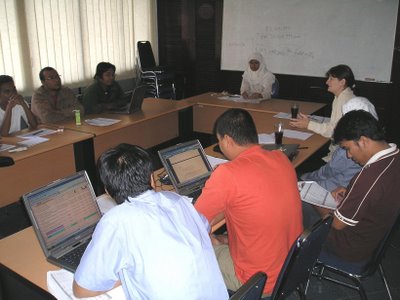September 1st - Project proposals
I have spent most of this week in the Banda Aceh field office where I have mainly kept myself busy helping to revise a number of community project proposals; four proposals, to be exact, from three different Community Development Boards (CDBs). These pertained to building a community hall, setting up a cow husbandry project, empowering a community cooperative and providing computers for a course.
For the husbandry projects, the CDB wished to procure one hundred cows; one per household. This was rejected because these should remain community projects and providing each household with a cow would not motivate the community to work together. Besides, the procurement of one hundred healthy cows would be a logistic nightmare. Instead, they were advised to form groups of, say, ten households who would be responsible for no more than five cows. The community did, however, devise a good system to care for the livestock and resolves disputes, should any arise.
Next, the idea for the community cooperative is to open a shop in the somewhat isolated village. The shop would sell basic need products as well as fishing material. In their budget they have also included a becak, a motorbike with a sidecar, for transportation. This is a good project and the details have been worked out quite carefully. But the problem was that there was no community contribution and they had made a budget for an excessive amount of money to buy supplies. The aim is simply to get the shop started with the basics so that they can expand on their own. They agreed to revise the budget and to contribute the space for the shop.
The last project concerns the purchasing of a number of computers to offer a course, in the first place for students who wish to pursue higher education and require basic computer skills in order to do so. This is a great initiative. A number of things, however, were missing in the proposal: a contract for the space that they will use to provide the course, for instance, a commitment letter from the teachers, a resolution to include the school in the project and a backup plan in case the CDB dissolves or the teachers decide to quit.
In some villages, they seems very aware of the fact they have a grant of up to 55.000,- USD (approximately 43,000,- EUR) available to them to realise their project(s). Although this is true, this does not mean that the whole amount must be spent. But this does seem to be the reasoning in a number of cases. Needless to say, the grants must be used for sound and sustainable projects that aim to have the greatest impact on as many people as possible with the least amount of money. There are conditions and every cent that is spent must be spent justifiably. Building a large community hall for 25.000,- USD (approximately 19.500,- EUR), for instance, is difficult to defend when there are other community needs that can be addressed – even if the community hall is the highest priority.
This is often a dilemma in community driven development programmes. While the idea is for us to stand on the sidelines and let the communities decide for themselves how to spend their grants, a number of demands must nevertheless be imposed. A certain degree of control is warranted, particularly because the capacities of the beneficiaries still require strengthening. Furthermore, the Integrated Community Programs (ICPs) must fit within a certain vision and broader programme. The trick is to find the right balance.
Also this week, a small workshop took place in Banda Aceh for the youth among the CDB members (above) and a CDR management meeting was held (below).
This is it again for this week. I am heading back into the field next week, starting with Meulaboh.
Take care,
Alex






0 Comments:
Post a Comment
<< Home